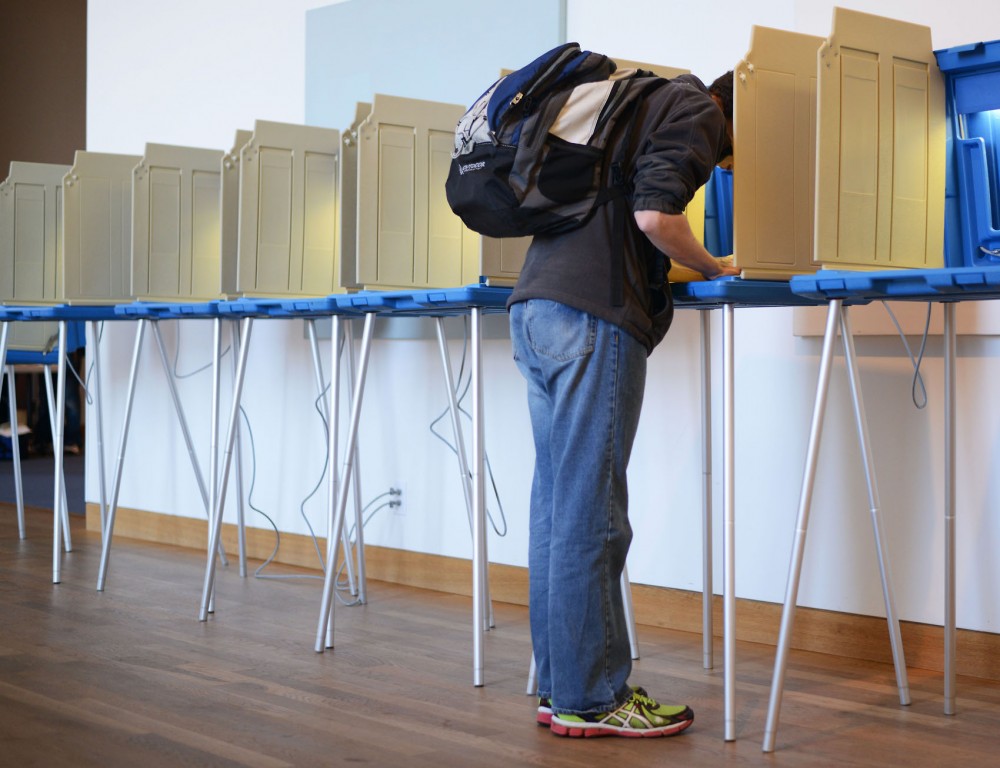An election that secured incumbents’ positions in two leading political offices — governor and Senate — and flipped the Minnesota House of Representative’s majority had political leaders re-evaluating election tactics Wednesday.
GOP and Democratic-Farmer-Labor leaders discussed campaign strategies, key issues and voter engagement at the University of Minnesota’s Humphrey School of Public Affairs on Wednesday afternoon, with both parties expressing some disappointment with results.
About 40 community members and a few students gathered in the Humphrey Forum for an analysis of Tuesday’s election results that featured state Sen. Michelle Benson, R-Ham Lake, and Ken Martin, DFL chair.
Republicans gained control of the state House of Representatives — a major victory for the party — and Democrats again secured the top offices of governor, U.S. senator and Minnesota secretary of state.
Wednesday’s speakers focused on county and district demographics in the discussion, noting a lower-than-usual Republican turnout in the suburbs.
Although Gov. Mark Dayton was re-elected, 53 of Minnesota’s 87 counties voted for Republican challenger Jeff Johnson. Dayton claimed 34 counties, including the state’s most populous.
“Greater Minnesota does not trust the DFL,” Benson said.
Martin expressed his disappointment with state Republicans taking control of the House, and he said the results of the Senate and governor’s races came as no surprise to him.
“I was not worried at the beginning of the year when the candidates were announced,” he said.
One possible deterrent for potential voters, Martin said, could have been politics’ recent shift toward what he called “one perpetual campaign.”
“People are turned off with the politics and are looking for someone who inspires,” he said. “Someone with a core set of convictions that drive them.”
Both Benson and Martin said ticket leaders need to develop a clear vision for Minnesotans and convey that to voters.
“You can’t just be against the Democrats. You have to give some reason how to move the party forward,” Martin said. “If you’re starting point is ‘no,’ then there’s no room for compromise.”
Both speakers said they were unhappy with Tuesday’s voter turnout, which was slightly over 50 percent statewide.
The role of the youth vote was also a hot topic during Wednesday’s discussion. Both Martin and Benson addressed the trouble the GOP and DFL have with engaging young voters.
“We’re not inspiring the next generation of voters,” Martin said. “We have responsibilities to put the rhetoric down and inspire people, despite our
differences.”
Chang Vang, a graduate student studying social work, said a lack of on-the-ground campaigning that targets young voters was likely a reason for low voter turnout, despite a large election social media
presence.
Rep. Phyllis Kahn, DFL-Minneapolis, who represents areas surrounding the University, was re-elected Tuesday for her 22nd term and attended the discussion.
Although party leaders expressed concern over rallying young voters, Kahn said her last-minute campaigning efforts on campus with the University’s College Democrats were more successful than they were at any point in her 42-year career with the Legislature.
“I’ve never had one with that level of turnout and effectiveness,” she said.
Despite disappointments on both sides, party leaders said they will both look further at the election’s results to improve future performance and strategies.
“I think we are just getting our party back on its feet,” Benson said.







